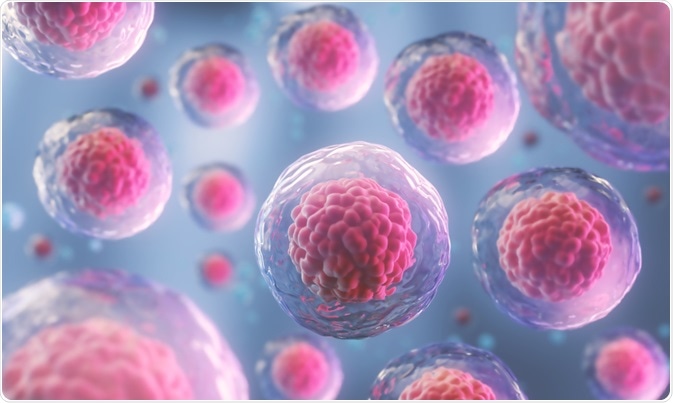Stem cells are different from other cells in the body. There are three unique properties of all stem cells regardless of their source. These include:-
- the capability of dividing and renewing themselves for long periods
- being unspecialized and basic cells
- they can give rise to any type of specialized cell because they are unspecialized

Human Stem Cells. Image Credit: Anusorn Nakdee/Shutterstock.com
Difference between embryonic stem cells and adult stem cells
Two basic factors in stem cell research are the difference between embryonic stem cells that proliferate for a year or more in the laboratory without specializing or differentiating into different types of cells and adult stem cells that cannot proliferate without differentiating.
Another baffling factor is the presence of certain triggers and regulators that control stem cell proliferation and self-renewal.
Stem cells are unspecialized
One of the main properties of stem cells is that they are unspecialized. They are basic cells. Stem cells do not function like nerve cells, muscle cells, gland cells, or any other specific cell of the body.
Proliferation and specialization
The property of being unspecialized also accompanies the fact that these cells can divide and renew themselves for long periods.
Normally muscles cells, nerve cells, blood cells, and other specialized cells do not normally replicate themselves but stem cells have the capability to do so. This replication is called proliferation. Proliferation over months can give rise to millions of cells. If the resulting cells are unspecialized, self-renewal continues for long periods of time.
The factors that prevent a stem cell from becoming specialized can help in increasing the effectiveness of the stem cells in proliferation.
Differentiation
When unspecialized stem cells give rise to specialized cells, the process is called differentiation. Some signals both from within and from outside the cell can trigger stem cell differentiation.
While signals within the cell are controlled by a cell's genes which are present over strands of DNA, the external signals for cell differentiation include chemicals from other cells, contact with neighboring cells, and the presence of certain molecules in the environment.
Further Reading